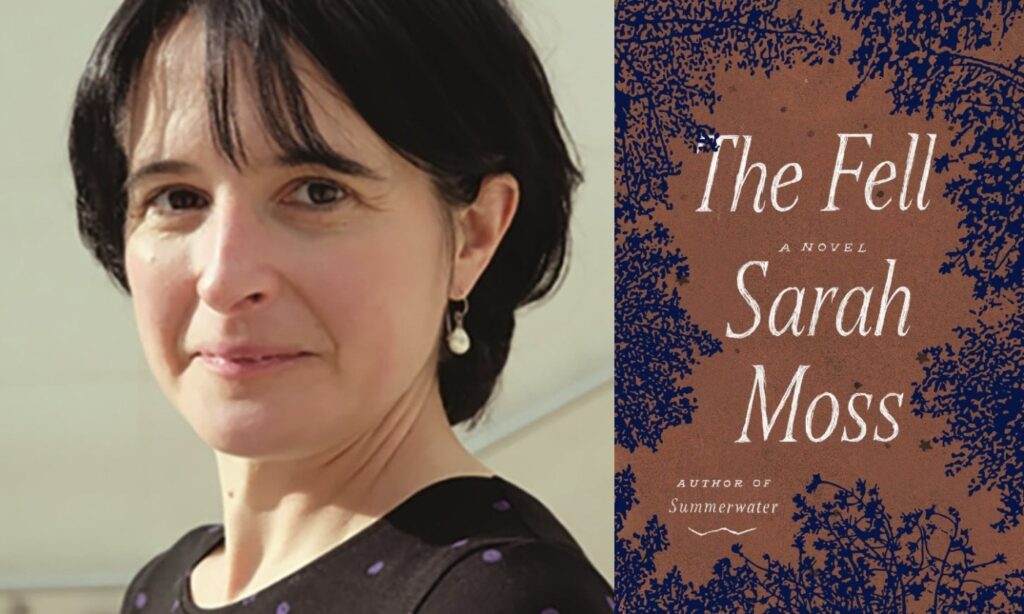
While in the midst of writing “The Fell,” Sarah Moss realized that she working on a dystopian novel. Yet, the British author’s latest novel isn’t quite like “The Handmaid’s Tale,” “Do Androids Dream of Electric Sheep?” or other examples of the genre.
It’s not set in the future and it’s not science fiction: “The Fell,” out on March 1, is set in 2020, in the U.K. and the pandemic that has hit is clearly COVID-19, even if it’s not mentioned by name.
“This is exactly how you would write a dystopian novel, except that it’s a realist novel, apart from the talking bird,” she says on a recent video call from her home in Dublin, Ireland.
Moss doesn’t dig into the particularities of the virus that has spent the past two years upending daily life. Rather, she looks at how individuals and communities have reacted to a public health emergency, asking questions that will endure long after we’ve figured out how to live with COVID-19.
“I think that a lot of what we see as being particular to COVID is going to come back when we finally confront the real emergency, which is climate change, because so many of the issues will be similar,” says Moss. “When resources are limited, what counts as essential? How can we respond to an emergency in ways that don’t exacerbate social injustice? How do we combine a commitment to social justice and human rights with the need to conserve diminishing resources? These are the pandemic questions, but they will also be climate emergency questions.”
“The Fell” follows its characters of different generations and backgrounds as they cope with life during lockdown. A crisis arises when one woman goes missing, raising the question of how to respond when a family member, friend or neighbor needs help and you’re supposed to keep your distance.
“I was thinking a lot about risk-taking and individual versus collective well-being and welfare,” says Moss, who moved to Ireland from the U.K. early in the pandemic. She wrote the novel at a time when people in Dublin were barred from traveling more than three miles from home.
In particular, she considered how lockdown changed people’s attitudes toward each other – and about kindness. “There was so much moralizing and judgment,” she says. “I wondered what we were losing.”
While there is no single pandemic experience, the characters reveal what they miss about their old lives and how they really feel about the restrictions, which present a range of feelings that are relatable to all.
“I know that it’s been different in different places, but in both Ireland and England, we were forbidden to leave the house for quite long periods, which meant that the people who previously had been alone became lonely. People who had been previously in family groups became stifled,” says Moss. “I think everybody I knew was either desperate to get away from the people they lived with or desperate to see people. There didn’t really seem to be any middle ground.”
She adds, ”There are four people in my household and we were together more than we had ever been, ever really.”
Moss also reflected upon how people responded to the once-simple question of how they were doing. “Every conversation, every time you said, ‘How are you?’, the response had to be, ‘Well, I’m very lucky. I’m not in intensive care and I’m not dead,’” she recalls. “Yeah, we’re always lucky not to be in intensive care and not to be dead, but that’s not answering the question: How are you?”
Moss says that reveals a lot about how the pandemic has impacted society beyond the symptoms of the disease itself.
Related links
‘Clean Air’ is a dystopic serial killer novel, but author Sarah Blake says joy is her aim for readers
The wild making of ‘Mad Max: Fury Road’ revealed in new oral history book
How novelist Jessamine Chan created the dystopian ‘School for Good Mothers’
In a pandemic-scarred Old West, ‘Outlawed’ finds women in peril and fighting back
Sign up for our free newsletter about books, authors, reading and more
“I thought that’s such an apolitical move – to be put in a position where you simply have to be grateful to be alive, to be refused permission to demonstrate or complain or object or protest,” says Moss. “I could see that was serving all sorts of interests in all sorts of ways that are quite frightening. So, I was thinking about all of those feelings contained in houses, the guilt about being privileged, it erases your right to feelings, the desire to get away from people, the desire to get to people and all of it intensified while locked down.”
All this amplifies the fundamental question at the core of “The Fell,” one that could be applied to many different situations. “It’s really about how do we co-exist under pressure,” says Moss of the novel. “The exact nature of the pressure, I think, is non-crucial.”
